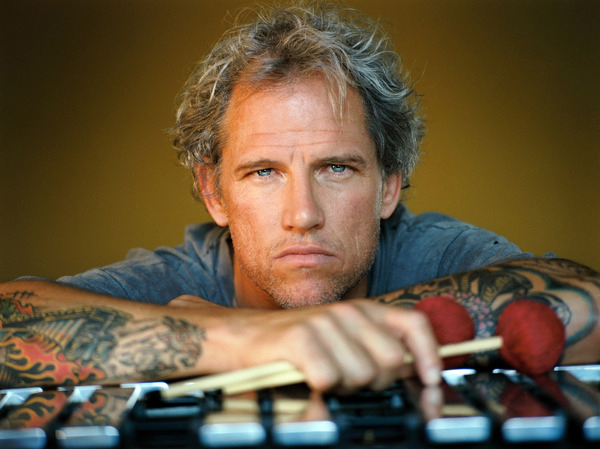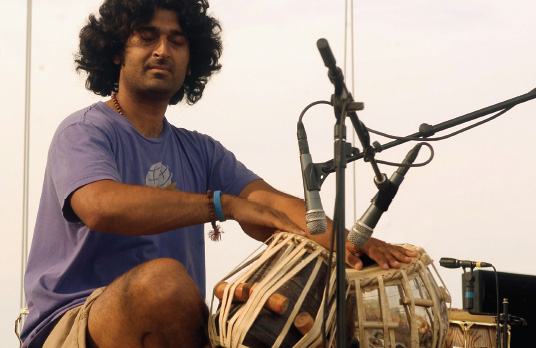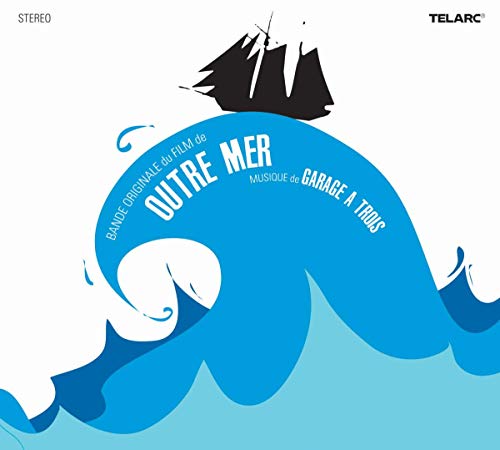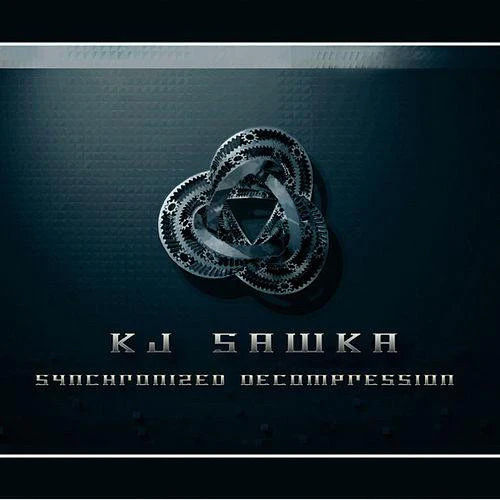Mike Dillon (Garage a Trois, Les Claypool, Critters Buggin’)

A multi-instrumentalist who’s played shoulder to shoulder with such kit heavyweights as Stanton Moore and Matt Chamberlain, Mike Dillon began his percussion journey in 1975, when he was 10 years old and “always wanting to hit on things.” Although best known today as a vibe/marimba man, he started as many others do on drum set, taking lessons with local teachers and working through rudiment books. He played a good deal of classical mallets when he went to college at North Texas State, where the Latin percussion bug bit him hard as well, but he seriously began getting into vibes in ’94 after watching Straight, No Chaser, an influential documentary on Thelonius Monk. Now over a decade later, he boasts a packed resume of recordings and live dates with the jam band elite.
Though he probably wouldn’t be comfortable with the characterization, Dillon embodies the first essential characteristic of a jam band percussionist—relentless dedication. “I always think about John Coltrane,” Dillon says, “how he was always practicing. He was really searching and defining what an instrument could do.” Channeling the spirit of Cortrane’s drive, Dillon combines restless devotion with an energy and adventurousness that for him is what the job is all about. “That’s the great thing about being a percussionist. There’s so much to study. The one thing that I was fascinated with from the get go at music school was the concept that your whole life you’re going to spend learning instruments. So now I’m [focusing on] the goal of playing a lot of instruments and making them sound like me.”
His sound—unique, eclectic, and with just a hint of irreverence—is also born of his desire to expand musical boundaries: “I like studying the jazz language on the vibes, but I’m a product of punk rock and rock. I bring all that stuff to my world and just play, putting the emotion and the fire into it.” Exactly what the great players have always done.
Listening to Dillon. For a fix of the funkiest vibe work that has ever slithered from New Orleans swampland, download “Bear No Hair” off Garage a Trois’ Outre Mer. Dig deeper into Dillon’s funky playing with the cut “Hungry Grasshoppers” off his self-titled solo album. And for those of you who feel particularly adventurous, check out any song from his group Hairy Apes BMX (a.k.a Butt Moving Experience), where he also handles rap duties.
Rajiv Parikh (New Monsoon)

One half of the percussion section for San Francisco–based jammers New Monsoon, Rajiv Parikh didn’t play music at all before picking up what many consider the most difficult and demanding of all percussion instruments—the tabla. The 33-year-old started studying it after high school, when he was 18 or 19, which is considered very late indeed in a tabla player’s life. Though he grew up with a love for music, particularly his father’s collection of Santana, Bob Dylan, and Stones albums, it wasn’t until his mother brought home a CD of classical Indian music that he found his calling. “I really had no idea about any of it,” Parikh explains. “So I put it on, and that was it. It was like divine intervention, really one of those moments that changed my life. The tabla player who was playing on the record was just blowing my mind. I didn’t know who it was. Later, I found out it was the man, Zakary Hussein. He just happened to be living in the Bay area and just happened to be starting his Summer tabla lessons. They say in Indian classical music that the student finds his guru, or teacher, and that the guru finds his student. And that’s really, profoundly what happened to me.”
Despite his late start, Parikh knows best the second characteristic of the jam band percussionist: You’re going to play a lot of gigs. New Monsoon logged in an average of 150 shows during 2003 and 2004. A musician’s dream scene, the jam-band performance space is created by the audience itself because jam band fans tend to be as dedicated as the bands they follow. And that’s okay with Parikh: “It’s a very cool thing I think. Most of the audience is music fans who come to the shows for the experience, for what it does to them. The jam band community is a terrific community of music lovers who want to see live music.” And as a jam band percussionist, you’ve got to want to play it. Just be sure to tape up your fingers.
Listening to Parikh. Got a taste for tabla? Download an example of Parikh’s skillful and subtle playing with the rest of the percussion section on “Dark Perimeter” from New Monsoon’s latest studio release, The Sound. Or indulge by going right to “Velvet Pouch” (where Parikh sings tabla bols) and to the appropriately titled “Tabla Solo” from Live at the Telluride Bluegrass Festival.
Andy Farag (Umphrey’s McGee)

Forget what you were expecting from a jam band—you know, all that meandering, distortion-free string-noodling stuff: Umphrey’s McGee can rock out. And with a possible set list of 130 to 140 original songs and about 200 covers, they can rock out for quite some time. Percussionist Andy Farag joined the Chicago-based, guitar-oriented band six months after the group played its first professional gig in ’98. A relative latecomer to the skins, Faraq began two years of drum-set lessons when he was 17, but being a percussionist is where his heart was. He made a complete switch to hand-drumming when he joined Umphrey’s, he credits his time with the band for shaping the player he is today. Though he is proficient in all afro-Cuban and Latin percussion, Faraq isn’t afraid to lay down just a little tambourine and cowbell if it’s called for.
And believe it or not, oftentimes that minimalist approach is exactly what’s needed. According to Farag, if you’re going to be a jam band percussionist, you have to master the art of adding color without clutter—or, to put it another way, you have to learn to play nicely with others. “I’ll really listen to what he’s [drummer Kris Myers] doing,” Farag explains. “When I hear him do a fill, maybe I’ll counter that fill, maybe I’ll play right after him. I’m always listening, and I think I’m good at coming up with good, tight, thought-out patterns that go along with all the other rhythms. I’m really big on that—not necessarily ripping all the time but coming up with a solid foundation for everything else to spice up the whole sound.”
Big ears are also essential during improvisational pieces, which have long been associated with playing in a jam band. Again, the stage is no place to bully your bandmates. Farag describes Umphrey’s improvisational approach as a little less free than some other bands’, preferring to play within and with an established structure rather than creating a new piece on the spot: “We try to make it sound like a song, like it’s been rehearsed. We try to add melodies and harmonies. One guy will come up with a riff and another guy will harmonize with that riff. Instead of just jumping in, I might sit back and listen for a minute or so and see what the best thing to add is, what would musically fit in that situation.”
Listening to Farag. For a lesson in listening, download “13 Days” from Umphrey’s McGee’s latest album, Anchor Drops. Farag keeps it simple by tastefully accenting Kris Myers’ hi-hat pattern with shakers. Adding just those few notes whips the groove thick and frothy.
Brian Carey (New Monsoon)
Rajiv Parikh’s percussion partner in New Monsoon, Brian Carey knows how important a well-trained ear is as well because he’s been working out his for two and a half decades. Primarily a Latin percussionist these days, Carey started off with a pair of sticks and a snare drum when he was eight years old, eventually graduating to a drum set and getting involved with marching band and drum corps during high school. Eventually, he had an affair with mallets, marimba, and timpani that was soon followed by a lasting relationship with congas, timbales, and bongos.
Besides the obvious good fortune of getting your hands all over a number of instruments, Carey points out another perk of playing percussion in a jam band. When the time is right, when the conversation calls for it, you actually get to use the chops you worked so hard to develop. Carey takes a solo every night with Monsoon, but like with everything else in a jam band, to play a solo is to play on the edge. Carey constantly attempts to push himself to new levels: “I fall into patterns like everyone,” he confesses about his solos. “Seemingly you’re never out of ideas, but when you play out so much and you don’t get a chance to practice so much on the road, you kind of fall into patterns. I’ll listen back to some of my solos, and I’m like, ‘I did that a week ago.’ So I’ve got to go back to the drawing board. You got to put that drum to the left and that drum to the right and change things around.” Sometimes you just have to make yourself a little uncomfortable.
If you’re going to walk the edge night after night, you have to work at keeping your balance. That lesson Carey learned early on and the hard, embarrassing way. When he was teenager, Carey’s high school band had the opportunity to perform at a state competition. The featured song had a tricky meter and tempo shift that Carey didn’t bother to rehearse. “I was 15 at the time and thought I was a bad ass,” Carey recounts. “I totally botched it. I was the goat of the whole band. That taught me at a young age, ‘Don’t think you’re so good.’ Because no matter how good you are, you’ve got to be prepared.”
Listening to Carey. Download “Another Night In Purgatory,” one of New Monsoon’s more rocking tunes from The Sound. Carey hammers down a conga rhythm behind a driving beat. And for an example of Carey’s playing on the edge, check out the jaunty tune “Calypso” from Live at the Telluride for the opening percussion solo that clocks in at over two and a half minutes.
Scott Messersmith (The Motet)
Scott Messersmith didn’t always know he’d be a professional musician, but one thing was for certain: “It became clear,” he says, “that music would guide my life.” Born in New Orleans (and with a healthy dose of second-line drumming in his blood), Messersmith has been banging on things since he five years old. He started on drum set but moved quickly to hand drumming. Interested in world music and instruments early on, he studied with an African percussion teacher from Senegal when he was 14, and during high school, he became involved in a drum and dance group that played West African and Afro-Cuban rhythms. He eventually dug even deeper into Cuban music by making several sojourns to Cuba to study bata.
Now 32 years old and an accomplished player by anyone’s standards, Messersmith has been keeping the beat peppery for The Motet since ’98, when he moved to Bolder, Colorado and met drummer-leader Dave Watts. Messersmith and Watts are The Motet’s remaining original members (some 20 to 30 musicians have passed through over the years), and as you might expect from a drummer-led group, there’s a strong focus on percussion. “Everybody in the band,” Messersmith boasts a little, “learns to play a little percussion.”
The Motet’s sound, then, is rhythmically textured, dense, and potentially tricky: It’s the kind of music that requires a percussionist to make careful choices. Not a machine-gunner of notes, though his chops are evident, Messersmith describes himself as “more of a groove guy” who listens to and attempts to interact meaningfully with his bandmates. “I try to whenever I play with someone to communicate in a musical way. I just try to be as musical as I can. I try to feel out what’s going on and fit in where I can.”
Like many of the percussionists featured here, Messersmith is wary of the jam band label and the type of playing it signifies, preferring instead to describe The Motet as an improvisational jazz-based band that fuses a number of styles and in the end tries to “make it all danceable.” Though the label has for him negative connotations, he without a doubt appreciates the jam band environment. “That’s one thing I like about the jam band scene,” he says. “There’s not much ego getting in the way of the music.”
Listening to Messersmith. Download “The Magic Way” for a jazzy jam-band sound that’s smooth, slick, and sexy. Just after the three-minute mark, the song neatly switches into a disco-flavored vibe with Messersmith complementing Watt’s groove with shakers and congas. For an example of economical playing at its best, listen to how Messersmith’s cowbell pattern on “What’s the Purpose” propels the beat.
Jeffree Lerner (Sound Tribe Sector 9)

Jeffree Lerner began playing on pots and pans at his grandparents’ house when he was very young (he describes drumming “as something that as a kid was an instinctual thing”), but he didn’t get serious until college, when he was around 19 years old. Always exclusively into hand drumming, and a little leery of formal study at first, he has developed a voice on the instrument that he feels is “kind of like music today…a melting pot.”
It’s also a voice that fits perfectly with his group, Sound Tribe Sector 9 (or STS9), a jam band that’s truly plugged-in. Lerner describes STS9’s sound as “balancing technology and traditional instrumentation,” and the result on their disc Artifact and the remix project Artifact: Perspectives—both bolstered by guest vocalists and rappers—is unconventional, unexpected fare indeed (even for a jam band). Marshalling the traditional array of African and Cuban percussion, Lerner also enhances the atmospheric, downtempo tunes with sampled sounds and rhythms from an Apple G4, taking the jam band genre—and the role of its percussionist—into the 21st century.
But even while venturing into the seemingly spacious realm of electronica, Lerner reiterates the importance of keeping your ears alert and your hands (or trigger finger) in check: “The drummer [Zach Velmer] I play with—not in any negative way—he’s a real busy drummer. He’s holding a lot of different spaces with that, so I guess the metaphor that I’ve always used—I think of the percussion as a water instrument. And so, I feel like these guys are building a landscape around me, and I kind of fit in between the crevices and spaces. I listen. We think of our music as a conversation. We try not to talk over each other, to interrupt each other…It’s a one band, one voice kind of thing.”
Such conversational courtesy—again, the percussionist’s art of playing color without clutter—engenders a sense of trust within the band that is to everyone’s benefit. Even the unpredictability of improvisation, which can feel frightening at first for less experienced musicians, becomes a haven for music making. “The space we create with the five of us,” Lerner explains, “seems like the safest place on the planet.”
Listening to Lerner. STS9’s latest disc, Artifact: Perspectives, is cooler than igloos, popsicles, and the tundra combined. Get a sample of Lerner’s breakneck drum ’n’ bass sampling on “Tokyo/Better Day Remix.” Cool down with the downtempo gem “Better Day Remix.”
Domingo “Sunny” Ortiz (Widespread Panic)

For those who like their jam southern fried, Domingo “Sunny” Ortiz cooks it up hot and plentiful with Widespread Panic. The most experienced of our septet of percussionists, he’s a multi-instrumentalist, proficient in all the usual bangables (including tablas), and is by turns funny, wise, and music-biz savvy. Listen up.
Hailing from Waco, Texas, he played his first show at eleven years old and spent the next few decades gigging and paying dues before moving to Athens, Georgia. The night Ortiz drove into down, he sat in with Panic, who immediately offered him a job (clearly the guys knew a great thing when they heard it, but it took a bit longer for Ortiz to join the lineup full-time). Now approaching nearly 20 years together, the band has made 15 albums, many of them live jam-band staples, and can perform five nights in a row without repeating a song. With that kind of history, you’d think the band might relax.
Despite the extensive experience playing together, Ortiz and the Panic boys still relish jamming on the edge. It’s a point of honor. “We pride ourselves on not doing the same shows night in and night out. We like to change it up. Even if we repeat a song on the seventh day, the solos may change and the places where the solos come in. So we’ve had lots of train wrecks. To us, that’s what still makes it fun. Some members of the audience will be like, ‘That was close.’ And we’ll think, ‘You don’t know how close that was.’ We still want to go to the edge. And there’s always a little ledge on the other side of the mountain that we can hold onto in case we want to regroup.”
With all the wily wisdom that only experience and perspective brings, Ortiz also knows it’s important to keep a level head because, hey, even though you’re a talented multi-instrumentalist with chops and ears and heart and passion, you’re only a percussionist after all. “You look at a band as a baked potato,” Ortiz says, just a little too pleased. “You’ve got your skin and your meat and the cheese and bacon. Well, I always say your percussion player is kind of like your chives. It’s nice to have, but you can do without it sometimes.”
Really, though, you can breath easy. When was the last time anyone actually asked to hold the chives?
Listening to Sunny. Check out what a few chives can do for the groove by downloading “Chilly Water” and “Postcard” from Widespread Panic’s newest album, Live at Myrtle Beach.





